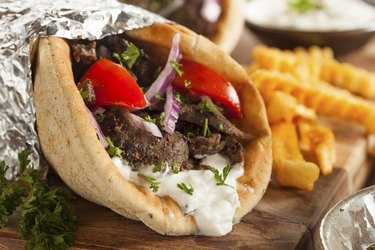
If you like to dig into a juicy gyro sandwich, you're probably not thinking about gyro meat nutrition – and discovering the gyro calories is likely the furthest thing from your mind. This protein-rich Greek specialty has some nutritional benefits, but it also contains saturated fat and cholesterol.
Tip
Gyros are most often made with lamb meat, which is relatively low in calories and contains abundant protein. Consuming lamb also provides you with some vitamins and minerals, but its healthy profile is tempered by higher fat and cholesterol numbers. There are no carbs in gyro meat.
Video of the Day
Working Out Gyro Nutrition
A traditional gyro contains lamb that is skewered and roasted vertically on a spit, then served on warm pita bread. Steak can also be used in stead of lamb. A creamy tzatziki sauce, blended from yogurt, cucumbers and spices, tops off this irresistible food, notes the University of Illinois Extension.
Video of the Day
The USDA states that a 100 gram serving of lamb meat, pared down to 1/8 inch fat, contains 217 calories and an impressive 26 grams of protein. There are zero carbs in gyro meat, so it might be appropriate for a low-carb diet.
Although there are no carbs in gyro meat, and it has some vitamins and trace minerals, it does contain 11 grams of fat. Lamb also has a high saturated fat content, the Cleveland Clinic points out. Consuming excessive amounts of saturated fat can help to elevate the "bad" cholesterol levels in your blood, and can also increase inflammation.
The University of Illinois Extension calculates the calories for a gyro made from four ounces of flank steak, wholewheat pita bread and a tzatziki sauce of Greek yogurt and spices. This contains 445 gyro calories, 44 grams of protein and 34 grams of carbohydrates. However, it also contains 15 grams of fat and 100 milligrams of cholesterol — so should probably be on your "occasional treat" list.
Read more: Is Lamb Meat Healthy?
Comparing Different Meats
The November 2017 edition of The Proceedings of the Nutrition Society noted that meats' nutritional values have gradually increased in importance. The study sought to identify methods for decreasing meat's fat content and fatty acid composition.
High-quality protein, vitamins and trace minerals, intramuscular composition and fat content figure into each meat's nutritional profile. Collectively, pork and poultry have a lower fat content than lamb or beef.
When looking at poultry nutrition, comparing chicken to lamb meat results in a clear win for chicken. Harvard Medical School details how a four-ounce boneless, skinless chicken breast contains 137 calories, compared to the 217 calories in a 3.5 ounce portion of lamb.
The chicken portion contains 21 grams of protein, less than the lamb's 26 grams. However, the chicken only has 5 grams of fat and 1.9 grams of saturated fat. The lamb's 11 grams of fat more than doubles that number, and the latter meat is also high in saturated fat.
Eating Gyro Meat on the Keto Diet
If you're following the popular Ketogenic diet (aka the "Keto diet"), Duke Diet & Fitness Center explains that lamb meat is definitely permitted. This restrictive diet consists mainly of protein, fat, vegetables, dairy and berries.
On the protein front, you're encouraged to eat lamb, beef, chicken, pork, ham, fish, eggs, tofu and other proteins. Fats such as avocado, nuts and seeds, olive oil and other liquid and solid fats are allowed, along with dairy products including hard cheese, butter and cream.
Although the Keto diet allows most non-starchy vegetables and limited berries, many popular foods are forbidden. These include starchy vegetables, grains, legumes, most fruit, beer, milk and sugars. If you're considering the Keto diet, know that there are several potential health risks. If you're dealing with high blood pressure or diabetes, consult with your physician first.
- University of Illinois Extension: "Going Greek with Gyros"
- USDA: "Lamb, Leg, Shank Half, Separable Lean and Fat, Trimmed to 1/8" Fat, Choice, Cooked, Roasted"
- Cleveland Clinic: "Fat: What You Need to Know"
- The Proceedings of the Nutrition Society: "Can We Improve the Nutritional Quality of Meat?"
- Harvard Medical School: "4oz Chicken Breast Nutrition Facts"
- Duke Diet & Fitness Center: "What Is the Keto Diet?"